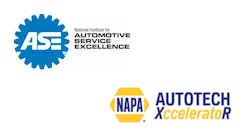In a roundtable discussion with a select group of North American truck industry editors, Göran Nyberg, president of sales and marketing for Volvo Trucks North America (VTNA) , said the company has “a laser focus” on its brands and on maximizing opportunities in the Class 8 market.
“2015 was a record year for us,” he stated, with 12.0 percent in the U.S. retail market, up 0.4 percent from 2014, “with record deliveries of 38,849 trucks” out of its New River Valley Plant in Dublin, Va.
Last year was “our best year in the U.S. It is a nice achievement, but it’s not good enough. We will do more.”
Among the growth areas VTNA is targeting is other industrial markets segments, including petrochemical, flatbed, intermodal and heavy haul, said Nyberg. At the same time, it will continue to focus on its core markets: long-haul and regional.
Magnus Koeck, vice president, marketing and brand management, noted that VTNA “is a leader in integrated powertrains,” with 95 percent market penetration in 2015. Some 83 percent of those have the I-Shift – a 12-speed, two-pedal, lightweight automated manual transmission (AMT) that delivers increased productivity by simultaneously maximizing driver comfort, safety, payload capacity and fuel efficiency.
Investments
Over the past five years, VTNA has made considerable investments in its operations to increase plant capacity and throughput, enhance vehicle quality and expand its dealer network. Among these: $38.1 million at it New River Valley Plant; $69 million in new equipment for its plants; $8 million to expand production for I-Shift production at its Hagerstown, Md., powertrain facility; and $70 million to augment its parts distribution centers.
Meanwhile, over the same timeframe, VTNA dealers have invested $500 million dollars to expanded their facilities, add new ones, hire additional technicians and continue to increase the skills and knowledge of their current workforce.
There are now 365 dealer locations, said Koeck, which is a 42 percent increase in bay capacity over the past five years. There has been a 100 percent increase in the number of technicians and a 229 percent increase in technicians who have earned “master” certification.
Nyberg said VTNA would like to add another 100 dealer locations going.
New product development is never ending, he noted, and the “focus is on adding value, decreasing fuel consumption and emissions and increasing efficiency.”
Cabs
The company is looking at future demands for the cab interior and the human interface to make them more comfortable, ergonomic and productive. The research is ongoing, said Nyberg, and involves looking at all age groups and their particular demands and needs.
“The cabs will be more high-tech but less complex,” he said.
Uptime
The Volvo Uptime Center, which offers around-the-clock assistance anywhere in Canada and the United States, plus remote diagnostics and technology, has helped fleets reduce downtime, said Koeck. The Center is manned by a team of highly trained personnel who can quickly manage service, schedule repairs and tackle any other issue that happens on the road.
With the connectivity to its trucks, VTNA is gathering a lot of data which will allow the company to be more predictive in vehicle repair and maintenance, he adds.
Nyberg feels predictive repair and maintenance will be a game changer but it will take time, as its requires a change of mindset, as fleets may be leery of investing in replacing parts that appear to still be in working condition.
The financial downside of a breakdown or losing a load over an unplanned repair is far greater, he noted, and suggested that fleets think more like the airline industry – were predictive maintenance is always the rule because planes cannot make a roadside stop if something goes wrong.
Uptime Centers
Meantime, VTNA has begun introducing Volvo Certified Uptime Centers within its dealer network as part of its ongoing commitment to maximizing customer uptime. Dealer locations will receive the certification after adopting a standardized process designed to provide more transparent information to the customer and complete repairs more quickly.
These Centers feature dedicated uptime bays, where trucks are triaged within two hours, explained Nyberg. Those requiring a repair time of four hours or less are serviced immediately, eliminating the “first come, first served” practice that is common in vehicle repair today.
So far, there are seven Volvo Certified Uptime Centers.
Connectivity
Volvo Group, parent company of VTNA and Mack Trucks, is “heavily investing” in research programs involved with connectivity and truck “platooning” systems. These would allow trucks to save fuel by traveling in a close-following, semi-autonomous “platoon” on the highway.
The systems typically build on advanced safety technologies, such as collision mitigation and adaptive cruise control systems, and electronically couple trucks through a combination of vehicle-to-vehicle communications, radar-based active braking systems and proprietary vehicle control algorithms.
Demand for this “will come faster than we think,” opined Nyberg, “and this will be a step-by-step approach.” The goal is to “help us develop products that are safer and more efficient.”

